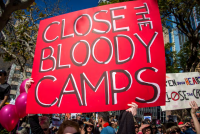I was denied access to Nauru because of my criticism of Australia’s offshore detention centres there. The secrecy around the camps calls for international attention
By Johanne Schmidt-Nielsen, a member of the Danish parliament for the Red-Green Alliance (Enhedslisten).
On 27 August, six Danish MPs boarded an aeroplane in Copenhagen. Our intention was to visit Australia and the tiny Pacific island state of Nauru – a country that depends on the money it receives for hosting the internationally criticised Australian offshore detention centre for asylum seekers.
The delegation consisted of MPs from six different political parties with different views on the Australian offshore asylum model. The nationalist Danish People’s party has for many years argued in favour of a similar model in Denmark. They suggest the deportation of refugees to a Danish military base in Greenland.
I, on the other hand, had sharply criticised the Australian camps in Danish and international media. The governing party in Denmark has been lying low, but the minister for integration, who was originally going on the trip, has indicated that inspiration could be sought in Australia.
On 29 August – just over 24 hours after arriving in Australia – we received a disheartening piece of information. Three MPs were denied access by the government of Nauru, which didn’t even try to hide the reason. Government representatives openly said to the chairman of the delegation and to the Danish embassy that critics were not welcome.
Nauru is an extremely poor country facing serious democratic challenges. Law professor and president of the Australian Human Rights Commission, Gillian Triggs, has been denied a visa. Very few journalists have been granted access to the camps.
It is, however, quite disturbing that Australia operates refugee camps on these conditions. During our visit to Canberra we met UNHCR representative Thomas Albrecht. He told us that after 30 years of working with refugees he expected that nothing could shock him. But on Nauru he saw greater hopelessness than anywhere else. He told us of his shocking encounter with a girl of about eight years old – the same age as his grandchild. He had asked her name. “EZBO7,” she replied. “No, what is your name,” he insisted. “EZBO7.” He told us about children that had stopped playing and about self-harm and attempted suicide even among pre-teenagers.
During our Australian visit, I repeatedly tried to get an answer to the question: who has the legal responsibility for the refugees on Nauru, in light of the Nauru files? I have asked high-ranking representatives of the Australian Department of Immigration and Border Protection and the assistant minister, Alex Hawke. After asking for a whole week I still haven’t got a clear answer. In the Nauru files, we can read about a great number of incidents where children were abused. The Danish delegation hasn’t been able to get an answer to the question whether even one single incident has been investigated by police or led to a verdict in court.
The vast majority of the asylum seekers who have been sent to Nauru and Manus Island have been recognised as refugees according to the UN refugee convention. They are supposed to be under protection and they will be at risk if they are sent home. But where can they go? After 10 years, their residence permit on Nauru will expire. What’s next? This question also remains unanswered.
As a European I wondered how this can take place within the framework of international law. Triggs gave me the answer. As opposed to Europe, where almost all countries are part of the European Convention on Human Rights (and its court), there is, in Australia, no authority with legal powers to stop human rights violations. UN committees may express criticism, but they can’t enforce the rules.
In Europe, we also have an ongoing debate on how to handle people who flee their countries. And rightwing politicians, not only in Denmark, praise the Australian model. If I were to even go near considering the concept of regional processing centres for asylum seekers, I would need good answers to these questions: how will you ensure that conditions in these centres live up to human rights and to the UN refugee convention? And how do you ensure a realistic perspective for resettlement?
The Australian camps are certainly no source of inspiration. On the contrary. The secrecy in itself and the undefinable legal responsibility call for a massive international condemnation.
Johanne Schmidt-Nielsen is a member of the Danish parliament for the Red-Green Alliance (Enhedslisten).

